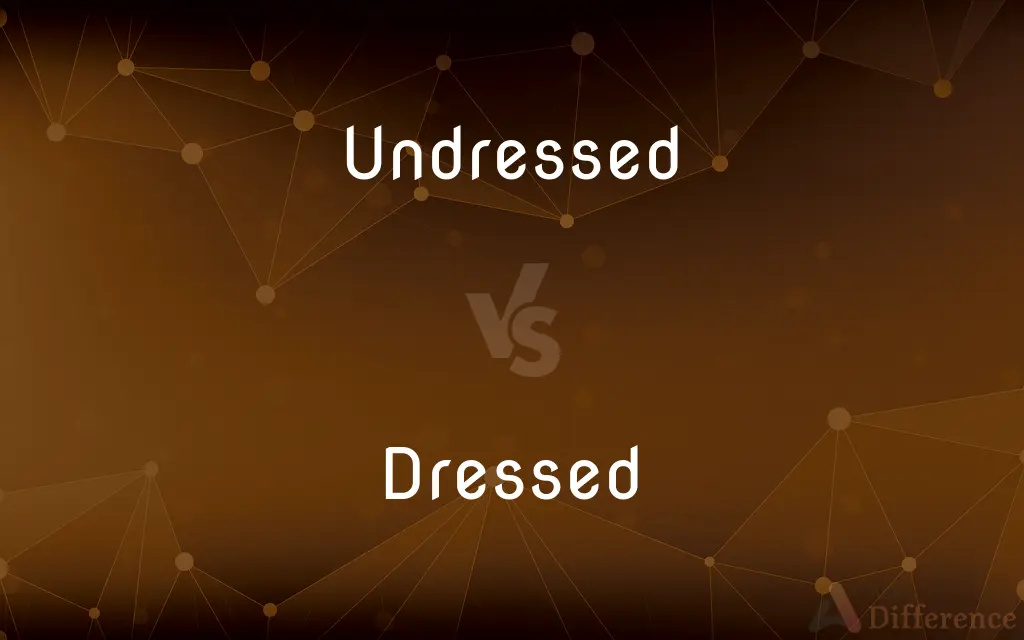Undressed vs. Dressed — What's the Difference?
Edited by Tayyaba Rehman — By Urooj Arif — Updated on March 15, 2024
Undressed refers to being without clothes, focusing on a state of nudity, while dressed implies wearing clothing, often with attention to style or occasion.

Difference Between Undressed and Dressed
Table of Contents
ADVERTISEMENT
Key Differences
Undressed typically denotes the absence of clothing, emphasizing a natural or bare state. This can refer to a person or an object that is not covered or adorned. On the other hand, being dressed means having clothes on, which can vary from casual attire to formal wear, depending on the context.
In many cultures, being undressed in public is considered inappropriate, highlighting societal norms and privacy concerns. Whereas, being appropriately dressed is often seen as a sign of respect and adherence to social etiquette, with specific dress codes applied in various settings.
Undressed states can also imply vulnerability or intimacy, where the lack of clothing signifies openness or a personal moment. Conversely, being dressed can symbolize preparedness, professionalism, or a form of self-expression, where the choice of clothing reflects personal identity or mood.
In artistic contexts, undressed subjects are often associated with realism, rawness, and the human form in its most natural state. In contrast, dressed figures can convey cultural, historical, or social narratives through their attire, highlighting the role of clothing as a storytelling medium.
In therapeutic or medical settings, being undressed is sometimes necessary for examinations or treatments, focusing on practicality and access. While in professional or formal occasions, being dressed appropriately is crucial, reflecting respect, decorum, and sometimes, the seriousness of the event.
ADVERTISEMENT
Comparison Chart
Definition
Without clothing; bare.
Wearing clothing, often with attention to style.
Cultural Perception
Often seen as private or intimate.
Associated with social norms and public presence.
Symbolism
Can symbolize vulnerability or natural state.
Reflects preparedness, professionalism, or style.
Contextual Importance
Required in medical or intimate scenarios.
Crucial in formal, professional, or public settings.
Artistic Representation
Associated with realism and human form.
Can convey cultural, historical, or social narratives.
Compare with Definitions
Undressed
Vulnerable or exposed.
His emotions were undressed during the heartfelt conversation.
Dressed
Wearing clothes.
She was dressed in a beautiful gown for the gala.
Undressed
Stripped of outer layers.
The undressed timber was ready for treatment.
Dressed
Covered or bandaged.
The nurse dressed the wound carefully.
Undressed
Not covered or adorned.
The undressed salad needed dressing.
Dressed
Adorned or decorated.
The dressed windows added charm to the storefront.
Undressed
Lacking usual furnishings or accessories.
The room appeared undressed without curtains.
Dressed
Prepared or treated in a certain way.
The chef dressed the salad with an exquisite vinaigrette.
Undressed
Undressed is an American anthology series that aired on MTV from July 26, 1999, to September 5, 2002. The series was created and executive produced by British director Roland Joffé.
Dressed
Made presentable or suitable for an occasion.
He dressed the set for the upcoming play.
Undressed
Naked.
Dressed
To put clothes on; clothe.
Undressed
Partially but not fully dressed.
Dressed
To furnish with clothing.
Undressed
Not finished or worked
Undressed stone.
Dressed
To decorate or adorn
Dress a Christmas tree.
Undressed
Not specially treated or processed
Undressed leather.
Dressed
To garnish
Dressed the side dish with parsley.
Undressed
Not prepared for cooking or eating. Used of certain meats.
Dressed
To arrange a display in
Dress a store window.
Undressed
Lacking sauce or dressing. Used of a salad.
Dressed
To arrange (troops) in ranks; align.
Undressed
Not treated or bandaged
An undressed wound.
Dressed
To apply medication, bandages, or other therapeutic materials to (a wound).
Undressed
Having partially or completely removed one's clothes.
Dressed
To arrange and groom (the hair), as by styling, combing, or washing.
Undressed
(of a wall, etc.) Whose surface has not been dressed (prepared).
An undressed wound
Dressed
To groom (an animal); curry.
Undressed
(of salad, etc.) Without dressing.
Dressed
To fertilize (land or plants).
Undressed
Simple past tense and past participle of undress
Dressed
(Archaic) To cultivate (land or plants).
Undressed
Of lumber or stone or hides; not finished or dressed;
Undressed granite
Undressed hides
Dressed
To clean (fish or fowl) for cooking or sale.
Undressed
Having removed clothing
Dressed
To put a finish on (stone or wood, for example).
Dressed
To tan or prepare (a hide) in leather-making.
Dressed
To put on clothes.
Dressed
To wear clothes of a certain kind or style
Dresses casually.
Dressed
To wear formal clothes
Dress for dinner.
Dressed
To get into proper alignment with others
The troops dressed on the squad leader.
Dressed
Clothing; apparel.
Dressed
A style of clothing
Folk dancers in peasant dress.
Dressed
A one-piece outer garment consisting of a skirt and bodice.
Dressed
Outer covering or appearance; guise
An ancient ritual in modern dress.
Dressed
Suitable for formal occasions
Dress shoes.
Dressed
Requiring formal clothes
A dress dinner.
Dressed
Simple past tense and past participle of dress
The girls were dressed in green; the shrimp sandwich dressed with lettuce and tomato is their top seller
Dressed
Having been subjected to a preparatory process or treatment; treated, prepared.
Dressed
Prepared for eating, especially by the addition of specific condiments or dressing.
Dressed
Wearing clothes; attired (now often with qualifying word).
Dressed
(in combination) Wearing a dress.
Dressed
Same as attired.
Dressed
Covered with medication or a bandage ; - of wounds.
Dressed
Trim and smooth; - of lumber or stone.
Dressed
Dressed or clothed especially in fine attire; often used in combination;
The elegantly attired gentleman
Neatly dressed workers
Monks garbed in hooded robes
Went about oddly garmented
Professors robed in crimson
Tuxedo-attired gentlemen
Crimson-robed Harvard professors
Dressed
Treated with medications and protective covering
Dressed
(of lumber or stone) to trim and smooth
Dressed
Dressed in fancy or formal clothing
Common Curiosities
Does being undressed always imply nudity?
Primarily, yes, but it can also mean something is stripped of its coverings or adornments, not just in the context of a person.
How does one choose how to be dressed for an occasion?
Choosing attire for an occasion involves considering the event's formality, cultural expectations, and personal style.
Is it acceptable to be undressed in public?
Generally, being undressed in public is not acceptable due to cultural norms and privacy concerns.
Why might someone be required to be undressed in a medical setting?
Medical examinations or treatments often require access to certain body parts, necessitating a state of undress for practical reasons.
What does it mean to be undressed?
Being undressed means not wearing any clothes, often highlighting a state of nudity or bareness.
Can "dressed" refer to something other than clothing?
Yes, "dressed" can also refer to preparing or adorning something, like dressing a salad or a decorated window.
Can being undressed have artistic significance?
Yes, in art, undressed figures can represent realism, human vulnerability, or the natural state of the human form.
What is the importance of being appropriately dressed?
Being appropriately dressed reflects respect for the occasion, adherence to social norms, and can influence first impressions.
How do clothing choices reflect personal identity?
Clothing choices can express individuality, mood, cultural background, and personal values, serving as a form of self-expression.
How do societal norms influence perceptions of being undressed or dressed?
Societal norms dictate what is considered appropriate attire in different contexts, influencing how being undressed or dressed is perceived.
Share Your Discovery

Previous Comparison
Dealer vs. Distributor
Next Comparison
Teenagehood vs. TeenagerhoodAuthor Spotlight
Written by
Urooj ArifUrooj is a skilled content writer at Ask Difference, known for her exceptional ability to simplify complex topics into engaging and informative content. With a passion for research and a flair for clear, concise writing, she consistently delivers articles that resonate with our diverse audience.
Edited by
Tayyaba RehmanTayyaba Rehman is a distinguished writer, currently serving as a primary contributor to askdifference.com. As a researcher in semantics and etymology, Tayyaba's passion for the complexity of languages and their distinctions has found a perfect home on the platform. Tayyaba delves into the intricacies of language, distinguishing between commonly confused words and phrases, thereby providing clarity for readers worldwide.














































